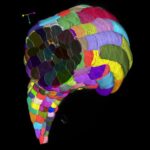The start of human dosing in a clinical trial Monday, plus a drug approval earlier this month, together offer the potential to reshape the treatment of the rare disease neurofibromatosis type 1 (NF1).
Healx, an artificial intelligence (AI)-based drug developer focused on treating rare diseases, said it dosed the first patient in a Phase II trial assessing its lead pipeline candidate HLX-1502 in patients with NF1, a genetic disorder of deregulated cell growth that affects about 1 in every 2,500 births worldwide, including approximately 100,000 Americans.
The Phase II INSPIRE-NF1 trial (NCT06541847) is an open-label, single-arm study designed to evaluate the safety and efficacy of HLX-1502 in NF1 patients with plexiform neurofibromas (PNs), aggressive tumors linked to functional impairments and malignant transformation.
The trial is enrolling approximately 20 patients in the United States. The study’s primary endpoint is PN response rate, with a ≥ 20% decrease in the volume of target PN considered a partial response. Other key outcome measures include safety and tolerability, and pharmacokinetics.
“This is much more than a company milestone—it represents a new hope for the NF1 community,” stated Tim Guilliams, PhD, Healx’s co-founder and CEO. “If successful, this could mark the beginning of a paradigm shift in NF1 care—one that not only improves patient lives today but also paves the way toward a future where patients no longer have to choose between treatment effectiveness and quality of life.”

HLX-1502 is an oral small-molecule mitochondrial dysregulator designed to prevent proliferation, growth, and viability of NF1 cells. HLX-1502 was discovered using Healx’s AI platform, and has received the FDA’s Fast Track, Orphan Drug, and Rare Pediatric Disease designations.
Speaking with GEN Edge recently, Guilliams said HLX-1502 offers nerve-specific accumulation resulting in a half-life of 90 hours on the nerve, and just two hours in plasma and the rest of the body—a safety profile that could enable preventing tumors or at least treating them earlier than now possible.
Prevention focus
“The drug accumulates in the nerve and gets cleared in the rest of the body. So, this could be a potential treatment with minimal side effects. That’s effective anti-cancer, anti-tumor therapy,” Guilliams said in an interview. “Because a lot of the patients have a benign form of the disease, our drug is the ideal candidate to start intervening earlier and toward something called secondary tumor prevention, which would be, from a patient impact perspective, incredible.”
Healx hopes HLX-1502 can emerge as an alternative to existing treatments targeting the mitogen-activated protein kinase kinase (MEK) pathway, which is involved in the growth of tumors.
The latest of those treatments, for a form of NF1, emerged on February 11. The FDA approved SpringWorks Therapeutics’ Gomekli® (mirdametinib), indicated both for children ages 2+ and adults with NF1 who have symptomatic PNs not amenable to complete resection. Gomekli is the first approved treatment for any form of NF1 in adults.

“It is the first in class. Obviously, we think we’re best in class for children too,” SpringWorks CEO Saqib Islam told GEN Edge.
The FDA based its approval on data from the Phase IIb ReNeu trial (NCT03962543), which showed Gomeklin to have met the primary endpoint of confirmed objective response rate (ORR) as assessed by blinded independent central review, showing a 41% ORR in 24 of 58 adult patients, and a 52% ORR in 29 of 56 pediatric patients. The median best percentage change in target PN volume was -41% in adults and -42% in children.
According to SpringWorks, 88% of adults and 90% of children showed a confirmed response of at least 12 months’ duration, while 50% of adults and 48% of children showed at least 24 months’ duration.
Along with the approval, which occurred under Priority Review, the FDA also granted SpringWorks a pediatric disease priority review voucher (PRV). A 2024 study pegged the average value of a PRV at $100 million, though individual vouchers have sold for between $67.5 million and $350 million. Gomekli previously received the agency’s Orphan Drug and Fast Track designations.
$20,000 to $30,000 per month
SpringWorks estimated in a regulatory filing that the average cost of treatment is approximately $22,000 per month for children and $30,000 per month for adults. The company said it has committed to maximizing access to Gomekli and supporting patients taking the treatment through its SpringWorks CareConnections™ program, which includes insurance coverage information, financial assistance, and personalized educational and emotional services.
SpringWorks is studying additional development of the drug (under its generic name mirdametinib) in combination with BeiGene’s rapidly accelerated fibrosarcoma (RAF) dimer inhibitor (lifirafenib) in a Phase Ib/II trial in RAS/RAF mutant and other mitogen-activated protein kinase (MAPK) pathway aberrant solid tumors—and as a monotherapy in pediatric low-grade gliomas.
In gliomas, SpringWorks and St. Jude Children’s Research Hospital are partnering on the Phase II portion of a Phase I/II trial (NCT04923126) after sharing positive Phase I data at the 29th Annual Meeting & Education Day of the Society for Neuro-Oncology, held November 21-24, 2024, in Houston, TX.
Of 23 patients enrolled in the trial’s Phase I and Phase I expansion cohorts, 17 (74%) completed or remain on therapy, while four (17%) stopped for progression, and two discontinued for toxicities. Twelve of 19 patients with measurable tumors (63%) achieved an objective response (one major, six partial, and five minor responses). Median time to an objective response was 5.4 months.
“There was some very good data that came out of that, and likely we are going to move based upon that data toward a guideline-based approval to be able to use mirdametinib in pediatric low-grade glioma,” Saqib said. “This MEK inhibitor is quite brain penetrant, which is why they [St. Jude] were originally interested in it, and that’s why they’re looking at it in that indication.”
The approval of Gomekli is one reason why SpringWorks’ shares soared 49% between February 7 and Thursday, from $40.28 to $59.93, before shares dipped to $56.56 at the close Monday. Another reason: Merck KGaA, Darmstadt, Germany, has confirmed it is in advanced talks to acquire SpringWorks—a speculated reason why the company last week canceled a scheduled earnings call with analysts to discuss fourth quarter and full-year 2024 results.
Up to $7.5B projected value
Yaron Werber, MD, a managing director and senior biotechnology analyst with TD Cowen, has projected the value of a German Merck buyout of SpringWorks at between $6 billion and $7.5 billion, or $80 to $100 per share, based on 4-5x the projected $1.5 billion peak sales of both Gomekli and Ogsiveom, according to numerous published reports.
SpringWorks finished 2024 with a net loss of $258.1 million, a 21% improvement from its $325.1 million net loss in 2023, thanks to some of the $172.042 million in net product revenue generated by its first approved drug Ogsiveo® (nirogacestat), a gamma secretase inhibitor indicated for adults with progressing desmoid tumors who require systemic treatment. Ogsiveo generated $5.447 million in net product revenue during its first month on the market in December 2023.
Gomekli is the second FDA-approved drug for NF1. The first is AstraZeneca’s Koselugo (selumetinib), which was authorized by the agency in 2020 solely to treat children ages 2 and older. Koselugo generated $631 million in total revenue last year (up 91% from $331 million in 2023), of which $265 million came during the fourth quarter, more than triple the $85 million AstraZeneca racked up in Q4 2023.
Koselugo’s recommended dose is 25 mg/m2 taken orally twice daily. By contrast, Gomekli is available in 1 and 2 mg capsules and in a 1 mg tablet designed to dissolve easily in water. Gomekli’s recommended dose is 2 mg/m2 orally twice daily, with or without food, for the first 21 days of each 28-day cycle.
“Our molecule has many advantages, including formulation, but also in terms of its potency, which allows it to be dosed intermittently—three weeks on, one week off,” Saqib said. “That gives the system a break, which allows people to stay on drug longer and minimizes AEs [adverse events], certainly compared to Koselugo.”
Effective treatments, but considerable side effects
A 2020 review overview by the Clinical Care Advisory Board of the Children’s Tumor Foundation reported that MEK inhibitors have been shown effective in shrinking inoperable PNs as well as progressive low‐grade gliomas.
However, the review also noted that the treatments have also been associated with considerable side effects that have included skin toxicities such as rashes, acneiform dermatitis, and itching; ocular toxicities such as dry eye, periorbital edema, and retinopathy; and in rare cases cardiac toxicity such as decreased ejection fractions.
Guilliams said children diagnosed with NF1 typically do not see tumors for a couple of years following diagnosis. When tumors begin appearing, they are benign, which gives patients and their caregivers three risky choices: an operation, MEK inhibitors, or doing nothing.
“In this period where people typically do nothing and watch the tumors grow and spread, our drug could intervene. And that’s a paradigm shift for the care pathways of those patients and their families,” Guilliams said. “That’s the type of breakthrough that we’re excited about.”
Guilliams, a biochemical engineer and tech entrepreneur, co-founded Healx in 2014, a year after graduating from the University of Cambridge with a PhD in biophysics and neuroscience. While at Cambridge, he met David Brown, PhD, former global head of drug discovery at Roche, who was exploring how to use technology to repurpose existing drugs, just he oversaw the repurposing of sildenafil from an angina drug into the blockbuster erectile dysfunction drug Viagra during his days at Pfizer.
Healx has since raised more than $100 million in capital, Guilliams said—including a $47 million Series C financing completed last August.
Guilliams and Brown launched Healx as a tech-based drug redeveloper after meeting Nick Sireau, PhD, CEO and chairman of the U.K.-based Alkaptonuria (AKU) Society. At the time, Sireau was seeking to repurpose the component of a weed killer as a potential treatment for the rare genetic disease, a condition affecting his two sons. Sireau ultimately raised £10 million ($12.62 million) toward studies supporting an AKU treatment indication for nitisinone, granted in 2020 by the European Medicines Agency (EMA) 15 years after the regulator initially approved the drug for another rare disease, hereditary tyrosinemia type 1 (HT-1).
In the United States, the FDA in 2002 approved an HT-1indication for nitisinone, which is marketed as Orfadin® by Sobi (Swedish Orphan Biovitrum).
“When we heard his personal story, we really thought that this is an area where AI could be helpful,” Guilliams said. “There are so many rare diseases without approved treatments, and rare disease parents like Nick, who basically set up foundations and go on a journey to find treatments for their kids. That’s really how we got started.”



